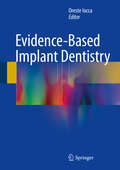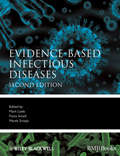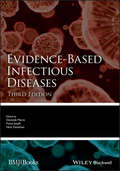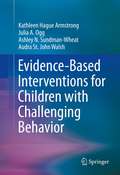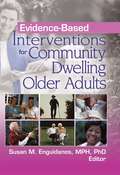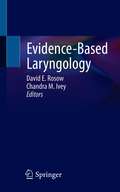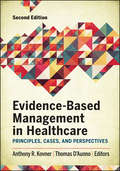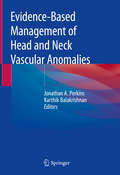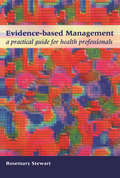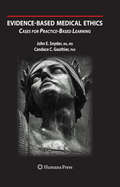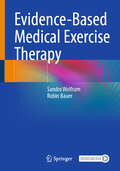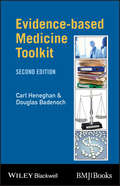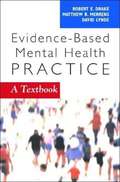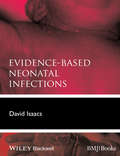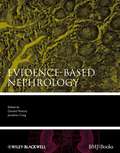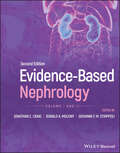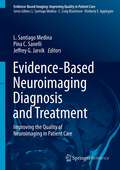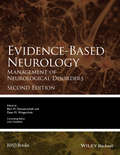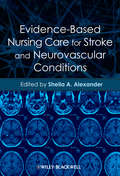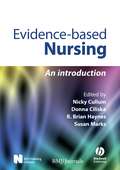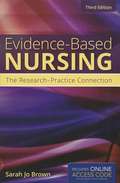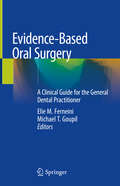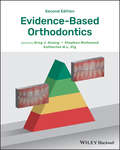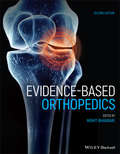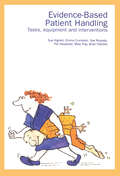- Table View
- List View
Evidence-Based Implant Dentistry
by Oreste IoccaThis book covers all aspects of implant dentistry, presenting up-to-date information that reflects the highest level of scientific evidence as presented in the specialized literature. Among the topics addressed by expert authors are the prognosis of natural tooth versus implant restorations, bone response to implant treatment, placement and loading time, implant design and length, platform design, implant abutments, prosthodontic treatment, reconstructive surgery, and periimplantitis. The amount of data available for the clinician working in the field of implantology is huge and constantly increasing. The task of remaining abreast of the latest evidence and applying it effectively in clinical practice is further hindered by the fact that many scientific papers make contradictory claims and contain methodological flaws and biases that generate confusion and lack of reliability. Against this background, Evidence-Based Implant Dentistry will serve the reader as a dependable and scientifically supported guide to current implant treatment and key issues in the field.
Evidence-Based Infectious Diseases (Evidence-Based Medicine #64)
by Fiona Smaill Mark Loeb Marek SmiejaThe fully updated Second Edition of this case-led text provides an excellent introduction to evidence-based Clinical Practice for the major areas of infectious disease management. The new edition takes on a brand new design and focus, making the book more accessible to junior doctors in infectious diseases and microbiology and general internists. Edited and written by the world’s leading infectious disease specialists, Evidence-Based Infectious Diseases contains thoroughly revised clinical chapters, reporting on all new major trials and is ideal for; trainees and clinical instructors in infectious diseases and microbiology, internal medicine physicians and public health physicians.
Evidence-Based Infectious Diseases (Evidence-Based Medicine)
by Fiona Smaill Dominik Mertz Nick DanemanWritten by an international team of authors specializing in microbiology and infectious disease, this new edition of Evidenced-based Infectious Diseases presents practical, up-to-date information on the care of individual patients suffering from infectious diseases. Each chapter addresses a series of focused clinical questions addressed in a systematic fashion, including a comprehensive literature search, and a rating of the quality of evidence using principles of the GRADE framework. Evidence-Based Infectious Diseases is the ideal reference work for all those involved with microbiology, infectious diseases, and clinical management.
Evidence-Based Interventions for Children with Challenging Behavior
by Audra St. John Walsh Kathleen Hague Armstrong Julia A. Ogg Ashley N. Sundman-WheatWhen a child has difficulties eating or sleeping, or throws frequent tantrums, many parents cross their fingers and hope it's a phase to be outgrown soon. But when they persist, challenging behaviors can follow children to school, contributing to academic problems, social difficulties, and further problems in adolescence and adulthood. The authors of Evidence-Based Interventions for Children with Challenging Behavior take a preventive approach in this concise, well-detailed guide. Offering best practices from an extensive Response to Intervention (RTI) evidence base, the book provides guidelines for recognizing the extent of feeding, sleeping, toileting, aggression, and other issues, and supplies successful primary, secondary, and tertiary interventions with rationales. Case examples integrate developmental theories and behavior principles into practice, illustrate how strategies work, and show how to ensure that parents and caregivers can implement them consistently for maximum effect. Progress charts, content questions, and other helpful features make this an invaluable resource for students and professionals alike. Included in the coverage: The prevention model and problem solving.Screening techniques.Evidence-based practices with children and their caregivers.Behavior principles and their application.Monitoring progress and evaluating outcomes.Plus helpful appendices, resource links, and other learning tools. Evidence-Based Interventions for Children with Challenging Behavior is an essential text for graduate students, scientist-practitioners/professionals, and researchers in child and school psychology; assessment, testing and evaluation; occupational therapy; family; educational psychology; and speech pathology.
Evidence-Based Interventions for Community Dwelling Older Adults
by Mph Susan M. Enguídanos PhD EditorA critical milestone in the evolution of evidence-based medicineEvidence-Based Interventions for Community Dwelling Older Adults presents an overview of significant evidence-based programs that can improve the health of seniors living in community-based settings. The book examines research conducted on a variety of health-related issues
Evidence-Based Laryngology
by David E. Rosow Chandra M. IveyThis text provides a critical look at the state of the evidence in the most compelling areas of laryngology. Rather than being a comprehensive text covering every single possible area, it focuses on published works in the 9 areas that are of the most interest to laryngologists as well as speech pathologists, general otolaryngologists, and head and neck oncologists managing laryngologic issues. The state of the literature is succinctly summarized and tabulated in each area, allowing the reader to see which areas have high-grade evidence (Levels 1 or 2) to support decision making, and which areas are in need of better quality studies. Each chapter is divided into three main sections: Diagnosis and Pathophysiology, Surgical management, and Non-surgical management. This makes it easier for the reader to browse to the area of interest in each section and to find the evidence basis for a given concept.Evidence-Based Laryngology will be an invaluable resource to otolaryngologists, residents, speech-language pathologists, and other clinicians who manage laryngological problems and would like to know the evidence basis behind different treatment options.
Evidence-Based Management in Healthcare: Principles, Cases, and Perspectives, Second Edition (AUPHA/HAP Book)
by Anthony KovnerInstructor Resources: Instructor Manual, Powerpoints, and a short talk on evidence-based management. Difficult decisions are part of everyday life for any manager, and the decisions that arise in the healthcare environment are far too important to be made based on poor information and gut feeling. An evidence-based approach to management ensures that healthcare leaders ask the right questions, use the best evidence available, and make better decisions in carrying out their mission. Evidence-Based Management in Healthcare: Principles, Cases, and Perspectives explains what evidence-based management is, how it can improve decision making, and, ultimately, how it can lead the way to improved organizational performance. This updated edition provides a thorough overview of evidence-based management, with an in-depth discussion of the framework, new and expanded case studies and examples, and interviews with experts in the field. Key topics include the following: The definition of and rationale for evidence-based management The four main types of evidence The six steps of implementation Acquiring the best available evidence Barriers to evidence-based management and how to overcome them Perspectives from stakeholdersFeaturing contributions from a host of experts—including researchers, managers, leaders, and consultants—this book provides a practical and insightful complement to other organizational and management studies. New managers will find it a useful resource to have on hand in healthcare management settings of any kind.
Evidence-Based Management of Head and Neck Vascular Anomalies
by Jonathan A. Perkins Karthik BalakrishnanThis text addresses vascular anomalies and the management of these diverse and clinically challenging set of conditions which have significant impact on patient function, quality of life and, in certain cases, survival. The text covers each category and type of vascular anomaly and the unique diagnostic and therapeutic challenges they pose. The chapters will also include fundamental scientific literature pertaining to each specific condition to help clinicians and clinical researchers better assess and manage vascular anomalies of the head and neck. Each vascular condition will be supported with medical photographs and radiographic images, summaries of diagnostic and therapeutic options, a list of syndromes and genetic mutations known to be associated with each anomaly, case studies, and clinical and research pearls from national and international leaders in the field. Management of Head and Neck Vascular Anomalies: Evidenced-based Assessment will be an invaluable resource for otolaryngologists, plastic surgeons, general and general pediatric surgeons, orthopaedic surgeons, dermatologists, interventional radiologists, residents and fellows in these fields, and researchers with interest in vascular anomalies of the head and neck.
Evidence-Based Management: A Practical Guide for Health Professionals
by Rosemary StewartThe NHS pension scheme is the largest in Europe. This guide explains how it works and how to maximize its benefits and avoid its pitfalls. The book covers: recent changes to the scheme including new provisions for early retirement; personal pensions, financial planning and investment options; advice on preparing for retirement and working after retirement; state benefits; and health and leisure in retirement. It is written for all NHS staff and should be of particular value to GPs and salaried doctors.
Evidence-Based Medical Ethics:
by Rosemarie Tong John E. Snyder Candace C. GauthierIn the modern practice of medicine, new challenges complicate the ethical care of patients. Today's times require a contemporary take on the concept of medical ethics. The idea for this textbook was born out of a need for a teaching resource that merges medical ethics theory with the practical needs of modern clinical medicine. In Evidence-Based Medical Ethics: Cases for Practice-Based Learning, the authors address what has been missing in existing text books and ethics courses to date - clear-cut ethical and legal guidelines that provide a method for the reader to learn how to systematically manage dilemmas seen in the everyday practice of medicine. The reader is guided through several "typical" patient scenarios and prompted by various questions that should be entertained by the treating health care provider. Then, relevant evidence-based medicine, legal precedent, and the ethical theory that applies to the situation are revealed. Often, finding the "best" ethical solution for each problem is automatic, as the solution often becomes self-evident during information-gathering. This general method is reinforced throughout the text with multiple different cases, using a practice-based approach by building on the reader's developing skills. Additionally, we have sought to emphasize a culturally competent manner in resolving these dilemmas, respectfully addressing issues of age, gender, and culture whenever possible. The main goal of Evidence-Based Medical Ethics: Cases for Practice-Bases Learning is to assist the reader in adapting a patient-centered and evidence-based approach to dilemmas faced in their future practice of medicine.
Evidence-Based Medical Exercise Therapy
by Robin Bauer Sandro WolframThis scientifically grounded and comprehensive practical book details all aspects of medical exercise therapy. It combines theoretical foundations, proven training methods, and their implementation in evidence-based practice, supplemented by concise summaries. From head to toe, all body areas are covered, including various body systems and their clinical pictures. With this book, you will learn to create tailored training plans and competently advise your patients in physiotherapy or sports therapy on topics such as nutrition, supplements, sleep, and mental training. Contents include: anatomical and physiological foundations, areas of medical exercise therapy such as strength endurance, maximal strength, speed strength, explosive strength, reactive strength, endurance, proprioception, and flexibility, age-related and disease-associated changes and their influences on training planning, assessment, training, and influencing factors such as mental status and muscle memory effect, and much more. Clinical pictures of the nervous system, such as Parkinson’s disease and multiple sclerosis, training after COVID-19, for migraines, dementia, and coronary heart disease.
Evidence-Based Medicine Toolkit
by Douglas Badenoch Carl HeneghanThis bestselling pocket guide to the skills of evidence-based medicine succeeds in demystifying the terminology and processes in a handy and easy-to-follow format, all within the space of 100 pages. With an improved layout, this second edition of Evidence-based Medicine Toolkit offers more up-to-date guidance as well as new sections on important areas of research. New features of this second edition include:A box for each major database showing how to search the evidence, and highlighting the differences between them Flow charts for different study types New critical appraisal sections on qualitative research and economic evaluation Expanded list of EBM resources on the net.With these added features to make the job easier, the new Toolkit is now an even better companion for all health care professionals using evidence-based methodology in their research and practice.
Evidence-Based Mental Health Practice: A Textbook
by Robert E. Drake Matthew R. Merrens David W. LyndeThis book explores some of the complex challenges in implementing EBPs, and highlights the meaningful opportunities that are inherent in this paradigm shift.
Evidence-Based Neonatal Infections
by David IsaacsEvidence-Based Neonatal Infections is expertly written by David Isaacs, an experienced author renowned for his knowledge in both pediatric infections and evidence-based medicine. It critically analyses the evidence for decision making in neonatal infections.Evidence-Based Neonatal Infections * The first evidence-based text on neonatal infections* Provides practical guidance where evidence is poor* Complements David Isaacs' Evidence-Based Pediatric Infectious Diseases (9781405148580)Practical and evidence-based, Evidence-Based Neonatal Infections is designed to help the clinician with day-to-day decisions on the care of newborn babies with possible, probable or proven infections. It considers clinical questions relevant to neonatologists, analysing the evidence carefully and providing recommendations for optimum management of neonatal infectious diseases, whilst reflecting on:Efficacy and safetyAntibiotic resistanceCost effectivenessAdverse effectsEthical considerationsEvidence-Based Neonatal Infections provides a unique reference for neonatologists, pediatricians, trainees, specialist nurses; general practitioners, microbiologists, infection control doctors, and all staff in neonatal units.
Evidence-Based Nephrology
by Donald A. Molony Jonathan C. CraigThis book covers the management of all major renal diseases from an evidence-based and patient-centred approach. With contributions from leading international experts who have a real understanding of evidence-based medicine it provides recommendations on treatment regimens to adopt for individual patients that are most strongly supported by the evidence.The inclusion of the latest observational and epidemiological data, as well as randomized controlled trial evidence ensures that the book properly reflects the current state of evidence available for nephrological practice. It will be a useful aid to all clinicians, including those caring for transplant and pediatric patients, as it covers the major clinical questions encountered by nephrologists.This reference is an invaluable source of evidence-based information distilled into guidance for clinical practice which will be welcomed by practitioners, trainees and associated health professionals.
Evidence-Based Nephrology, 2 Volume Set (Evidence-Based Medicine)
by Donald A. Molony Jonathan C. Craig Giovanni F.M. StrippoliEvidence-based Nephrology provides students of nephrology and practicing clinicians with a convenient single source of clinical evidence that has been passed through an evidence-based filter. This fully revised second edition incorporates substantial new available data, updated methods of research synthesis, and a renewed focus on consumer engagement in the evaluation and management kidney disease. This updated textbook includes twenty new chapters and three new sections, covering supportive care and patient-centered care and outcomes. In addition, every chapter that was in the first edition has been extensively updated. This new edition covers epidemiology, acute kidney injury, primary diseases of the kidney, secondary diseases of the kidney, chronic kidney disease and complications, hemodialysis, chronic kidney disease stage 5, peritoneal dialysis, supportive care, transplantation, electrolytes and acid-base disorders, and patient centered care and outcomes for both adult and for pediatric patients. Boasting a new co-editor along with several new chapter authors and section editors, Evidence-based Nephrology is now an even better evidence-based nephrology tool, where each chapter provides a clear foundation of the topic that is supported by the best current evidence. This new edition includes broader coverage of the available evidence and addresses crucial clinical questions regarding the treatment and care of people with all stages of chronic kidney disease, including people undergoing any form of dialysis (hemodialysis or peritoneal dialysis), those requiring kidney transplantation and pediatric patients. Evidence-based Nephrology, Second Edition, is a core resource for the evidence-based nephrology practitioner who is otherwise limited by time constraints from researching every question that may arise daily in the care of their patients.
Evidence-Based Neuroimaging Diagnosis and Treatment
by L. Santiago Medina Pina C. Sanelli Jeffrey G. JarvikEvidence-Based Neuroimaging is a user-friendly guide that employs evidence-based medicine criteria to systematically review the evidence defining the appropriate use of medical imaging for the brain, spine, head, and neck. Edited by L. Santiago Medina, Pina C. Sanelli, and Jeffrey G. Jarvik, the book provides a systematic framework for understanding the best imaging choices for patient care. Chapters highlight key points that support clinical applications, allowing fast access to pertinent information including patient selection, imaging strategies, test performance, cost-effectiveness, and applicability. The diagnostic imaging of many common diseases, disorders, and conditions are covered, including multiple sclerosis, acute ischemic stroke, dementia, Alzheimer's disease, traumatic brain injury, autism, spinal trauma, spinal infections, neck masses, thyroid cancer, and cervical lymph node metastasis. By offering a clear understanding of the science behind the evidence, the book fills a void for radiologists, neurologists, neurosurgeons, pediatricians, primary care physicians, and other clinicians with an interest in neuroimaging and a desire to implement an evidence-based approach into their daily practice.
Evidence-Based Neurology
by Bart Demaerschalk Dean Wingerchuk Livia CandeliseFrom an expert editor team drawn from the Cochrane Neurological Network, Evidence-Based Neurology provides specialists and those in training with the skills and knowledge to apply evidence-based practice in the clinical setting. fills the gap between guidelines and primary studies as well as between primary and secondary scientific medical literature summarizes the most recent and important findings on treatments for neurological patients measures the benefit and, when applicable, the risk of harm inherent in specific neurological interventions now includes new non-clinical topics of interest to neurologists such as education and research
Evidence-Based Nursing Care for Stroke and Neurovascular Conditions
by Sheila A. AlexanderWith the aging population ever growing, healthcare for persons suffering from stroke and related illnesses is increasingly important. Evidence-Based Nursing Care for Stroke and Neurovascular Conditions provides a comprehensive and practical guide for novice, experienced and advanced practice nurses working with patients suffering from stroke and other neurovascular conditions.With a focus specifically on neurovascular disorders, this highly detailed text offers easy-to-find information on evidence-based care guidelines. The book begins with a thorough introduction to normal cerebrovascular anatomy and physiology and common pathologic mechanisms, describing the unique challenges in working with this patient group. Later chapters provide the pathophysiology, diagnostic and current nursing interventions for the care of patients with neurovascular disorders including transient ischemic attacks, ischemic stroke, hemorrhagic stroke, Moyamoya, Migraines and more.Evidence-Based Nursing Care for Stroke and Neurovascular Conditions is a must-have resource for practitioners caring for patients enduring stroke and other neurovascular conditions.
Evidence-Based Nursing: An Introduction
by Susan Marks Donna Ciliska Nicky Cullum R. Brian HaynesWhat is evidence-based nursing? Simply, it is the application of valid, relevant, and research-based information in nurse decision-making. Used effectively, evidence-based nursing methods can be used to dramatically enhance patient care and improve outcomes. Evidence-based Nursing is a practical guide to evidence-based nursing for students and practitioners. Proceeding step-by-step, it enables nurses to understand and evaluate the different types of evidence that are available, and to critically appraise the studies that lay behind them. It also considers the ways in which these findings can be implemented in clinical practice, and how research can be practically applied to clinical-decision making. Easy to use step-by-step approach Explores all aspects of the evidence-based nursing process Includes updates of popular articles from Evidence-based Nursing Examines dissemination and implementation of research findings in clinical practice Includes clinical scenarios Chapters include learning exercises to aid understanding Evidence-based Nursing is a vital resource for students and practitioners wanting to learn more about research based nursing methods.
Evidence-Based Nursing: The Research-Practice Connection (Third Edition)
by Sarah Jo BrownEvidence-Based Nursing: The Research-Practice Connection, Third Edition introduces students to research methods and evidence-based practice (EBP). Written in an accessible style, the content moves readers through understanding how research is produced to appraisal at the critical thinking level. Timely information links evidence-based practice to recent work in the Safety and Quality programs that are underway in healthcare and nursing. Key Features:* Offers five common research designs, systematic reviews, and clinical practice guidelines by using a consistent, easy-to-read "Why-How-What" approach. * Exemplar research reports include "Profile and Commentary" that explain results of studies and help students better understand the methodological components of a study Accompanied by Instructor Resources:* Save time with a Test Bank and sample syllabus* Encourage critical thinking using additional learning activities, including discussion questions and small group assignments * Plan classroom lectures using PowerPoint Presentations created by the authorNavigate eFolio Now Available! Navigate eFolio: Evidence-Based Nursing , a fully supported and hosted online learning solution featuring an ebook and course management tools is also available for purchase. Navigate eFolio transforms how students learn and instructors teach by bringing together authoritative and interactive content aligned to course objectives, with student practice activities and assessments, an ebook, and reporting tools. For more information visit go. jblearning. com/nursingef
Evidence-Based Oral Surgery: A Clinical Guide For The General Dental Practitioner
by Elie M. Ferneini Michael T. GoupilThis book is designed to guide the dental practitioner in the medical and surgical management of the oral surgery patient. It provides dentists and dental professionals with up-to-date, evidence-based information on how to handle any oral surgical problem and how to work up a patient. The book is divided into five sections, the first two of which present overviews of general and basic perioperative topics and the principles of exodontia. Management of oral pathology is then discussed in detail, covering odontogenic infections, osteonecrosis, preprosthetic surgery, common oral pathology, biopsy techniques, and dentoalveolar trauma. The fourth section is devoted to topics in advanced oral surgery, such as disturbances of the temporomandibular joint apparatus, facial deformities, and dental implants. Finally, a series of illustrative case reports and unusual surgical cases is presented. The book is multi-institutional and multispecialty based. Both editors have extensive academic experience and have authored numerous scientific publications.
Evidence-Based Orthodontics
by Katherine W. Vig Greg J. Huang Stephen RichmondEvidence-Based Orthodontics, Second Edition retains important elements of the First Edition, with several new sections to improve its use as a quick and comprehensive reference. New updated edition of a landmark text that surveys the principles and practice of evidence-based orthodontics Offers practical strategies for professionals to incorporate EBO in their daily practices Presents brief summaries of the best evidence for a wide range of clinical topics Incorporates information from over 400 systematic reviews, listed by topic
Evidence-Based Orthopedics (Evidence-Based Medicine)
by Mohit BhandariEvidence-Based Orthopedics is an up-to-date review of the best evidence for the diagnosis, management, and treatment of orthopedic conditions. Covering orthopedic surgery as well as pre- and post-operative complications, this comprehensive guide provides recommendations for implementing evidence-based practice in the clinical setting. Chapters written by leading clinicians and researchers in the field are supported by tables of evidence that summarize systematic reviews and randomized controlled trials. In areas where evidence is insufficient to recommend a practice, summaries of the available research are provided to assist in decision-making. This fully revised new edition reflects the most recent evidence using the approved evidence-based medicine (EBM) guidelines and methodology. The text now places greater emphasis on GRADE—a transparent framework for developing and presenting summaries of evidence—to allow readers to easily evaluate the quality of evidence and the strength of recommendations. The second edition offers a streamlined presentation and an improved standardized format emphasizing how evidence in each chapter directly affects clinical decisions. Incorporating a vast amount of new evidence, Evidence-Based Orthopedics: Features thoroughly revised and updated content, including a new chapter on pediatric orthopedics and new X-ray images Provides the evidence base for orthopedic surgery as well as pediatric orthopedics and orthopedic conditions requiring medical treatment Covers the different methods for most orthopedic surgical procedures, such as hip replacements, arthroscopy, and knee replacements Helps surgeons and orthopedic specialists achieve a uniform optimum standard through a condition-based approach Aligns with internationally accepted guidelines and best health economic principles Evidence-Based Orthopedics is an invaluable resource for orthopedic specialists, surgeons, trauma surgeons, trainees, and medical students.
Evidence-Based Patient Handling: Techniques and Equipment
by Pat Alexander Sue Hignett Emma Crumpton Brian Fletcher Mike Fray Sue RuszalaProviding care and treatment for patients usually requires moving and handling activities associated with high rates of back injuries. The personal and financial cost of back pain and injuries to health staff means there is an urgent need to improve practice in this area. Over the past twenty years a number of guidelines have been published, however, these have been based on professional consensus rather than evidence. Evidence-Based Patient Handling tackles the challenge of producing an evidence base to support clinical practice and covers tasks, equipment and interventions. This book questions previously held opinions about moving and handling and provides the foundation for future practice.
